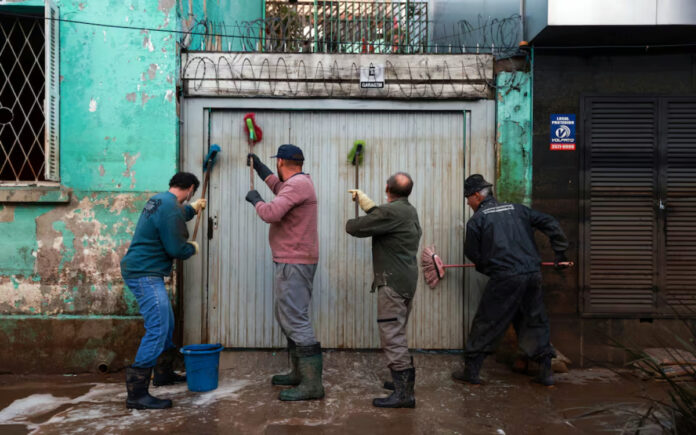Porto Alegre: Authorities in Brazil’s southernmost state warn of the looming risk of waterborne diseases as residents grapple with the aftermath of catastrophic floods that claimed the lives of at least 169 individuals.
Starting in late April, relentless rains caused several rivers and lakes in Rio Grande do Sul state to surge to unprecedented levels, displacing over 580,000 people from their homes, according to state officials.
Roberta Vanacor, head of the state’s health surveillance center, highlights leptospirosis as the primary concern among health officials. This bacterial disease, often transmitted through the urine of infected rats in stagnant water, has seen a surge in cases in recent weeks. Seven fatalities have been attributed to leptospirosis since the onset of the rains, with an additional 10 deaths under investigation. Health authorities report nearly 2,300 potential cases, of which 141 have been confirmed.
To address the surge in medical needs, the state has established four field hospitals and deployed mobile teams that have provided assistance to thousands of affected individuals.
Also Read | Third US Dairy Worker Infected with Bird Flu; Michigan Ramps Up Testing
The floods have created conducive conditions for the proliferation of leptospirosis bacteria, as noted by the health ministry, exacerbating the outbreak of the disease.
As residents return to their homes, they face additional hazards. “Snakes, scorpions, and spiders, these venomous animals will also seek shelter from rainwater in drier places,” warns Vanacor.
Officials also emphasize the mental toll inflicted by the destruction. Lieutenant Colonel Mauricio Specterow, overseeing a field hospital in Porto Alegre, acknowledges the fragility of the population’s mental state in this challenging period.
Among the returning residents is Joyce Fauth Correa, whose home in the Navegantes neighborhood stands coated in thick mud after floodwaters submerged it. Overwhelmed with emotion, she reflects on the devastation, lamenting the loss of cherished possessions and the erosion of her history.



